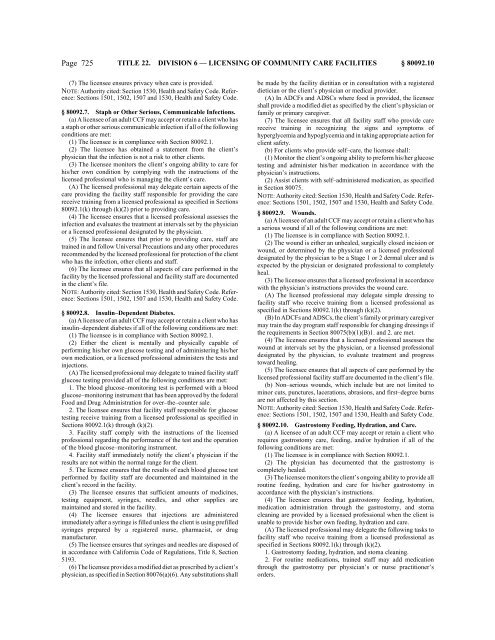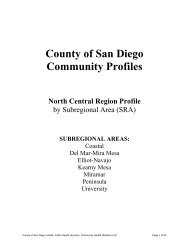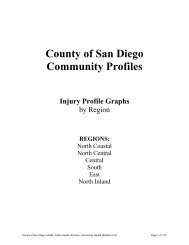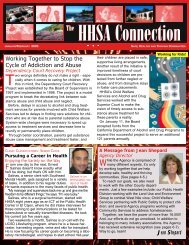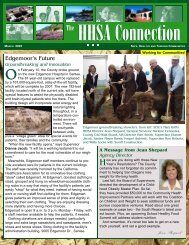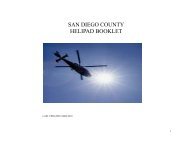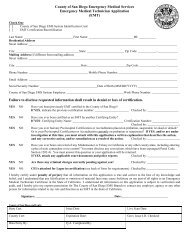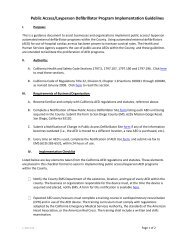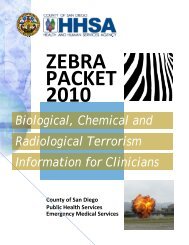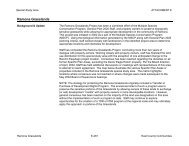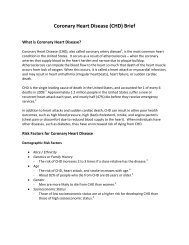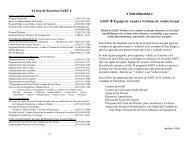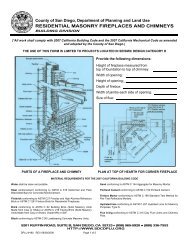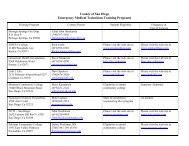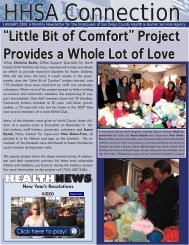CALIFORNIA CODE OF REGULATIONS - State of California
CALIFORNIA CODE OF REGULATIONS - State of California
CALIFORNIA CODE OF REGULATIONS - State of California
You also want an ePaper? Increase the reach of your titles
YUMPU automatically turns print PDFs into web optimized ePapers that Google loves.
Page 725<br />
TITLE 22. DIVISION 6 — LICENSING <strong>OF</strong> COMMUNITY CARE FACILITIES § 80092.10<br />
(7) The licensee ensures privacy when care is provided.<br />
NOTE: Authority cited: Section 1530, Health and Safety Code. Reference:<br />
Sections 1501, 1502, 1507 and 1530, Health and Safety Code.<br />
§ 80092.7. Staph or Other Serious, Communicable Infections.<br />
(a) A licensee <strong>of</strong> an adult CCF may accept or retain a client who has<br />
a staph or other serious communicable infection if all <strong>of</strong> the following<br />
conditions are met:<br />
(1) The licensee is in compliance with Section 80092.1.<br />
(2) The licensee has obtained a statement from the client’s<br />
physician that the infection is not a risk to other clients.<br />
(3) The licensee monitors the client’s ongoing ability to care for<br />
his/her own condition by complying with the instructions <strong>of</strong> the<br />
licensed pr<strong>of</strong>essional who is managing the client’s care.<br />
(A) The licensed pr<strong>of</strong>essional may delegate certain aspects <strong>of</strong> the<br />
care providing the facility staff responsible for providing the care<br />
receive training from a licensed pr<strong>of</strong>essional as specified in Sections<br />
80092.1(k) through (k)(2) prior to providing care.<br />
(4) The licensee ensures that a licensed pr<strong>of</strong>essional assesses the<br />
infection and evaluates the treatment at intervals set by the physician<br />
or a licensed pr<strong>of</strong>essional designated by the physician.<br />
(5) The licensee ensures that prior to providing care, staff are<br />
trained in and follow Universal Precautions and any other procedures<br />
recommended by the licensed pr<strong>of</strong>essional for protection <strong>of</strong> the client<br />
who has the infection, other clients and staff.<br />
(6) The licensee ensures that all aspects <strong>of</strong> care performed in the<br />
facility by the licensed pr<strong>of</strong>essional and facility staff are documented<br />
in the client’s file.<br />
NOTE: Authority cited: Section 1530, Health and Safety Code. Reference:<br />
Sections 1501, 1502, 1507 and 1530, Health and Safety Code.<br />
§ 80092.8. Insulin–Dependent Diabetes.<br />
(a) A licensee <strong>of</strong> an adult CCF may accept or retain a client who has<br />
insulin–dependent diabetes if all <strong>of</strong> the following conditions are met:<br />
(1) The licensee is in compliance with Section 80092.1.<br />
(2) Either the client is mentally and physically capable <strong>of</strong><br />
performing his/her own glucose testing and <strong>of</strong> administering his/her<br />
own medication, or a licensed pr<strong>of</strong>essional administers the tests and<br />
injections.<br />
(A) The licensed pr<strong>of</strong>essional may delegate to trained facility staff<br />
glucose testing provided all <strong>of</strong> the following conditions are met:<br />
1. The blood glucose–monitoring test is performed with a blood<br />
glucose–monitoring instrument that has been approved by the federal<br />
Food and Drug Administration for over–the–counter sale.<br />
2. The licensee ensures that facility staff responsible for glucose<br />
testing receive training from a licensed pr<strong>of</strong>essional as specified in<br />
Sections 80092.1(k) through (k)(2).<br />
3. Facility staff comply with the instructions <strong>of</strong> the licensed<br />
pr<strong>of</strong>essional regarding the performance <strong>of</strong> the test and the operation<br />
<strong>of</strong> the blood glucose–monitoring instrument.<br />
4. Facility staff immediately notify the client’s physician if the<br />
results are not within the normal range for the client.<br />
5. The licensee ensures that the results <strong>of</strong> each blood glucose test<br />
performed by facility staff are documented and maintained in the<br />
client’s record in the facility.<br />
(3) The licensee ensures that sufficient amounts <strong>of</strong> medicines,<br />
testing equipment, syringes, needles, and other supplies are<br />
maintained and stored in the facility.<br />
(4) The licensee ensures that injections are administered<br />
immediately after a syringe is filled unless the client is using prefilled<br />
syringes prepared by a registered nurse, pharmacist, or drug<br />
manufacturer.<br />
(5) The licensee ensures that syringes and needles are disposed <strong>of</strong><br />
in accordance with <strong>California</strong> Code <strong>of</strong> Regulations, Title 8, Section<br />
5193.<br />
(6) The licensee provides a modified diet as prescribed by a client’s<br />
physician, as specified in Section 80076(a)(6). Any substitutions shall<br />
be made by the facility dietitian or in consultation with a registered<br />
dietician or the client’s physician or medical provider.<br />
(A) In ADCFs and ADSCs where food is provided, the licensee<br />
shall provide a modified diet as specified by the client’s physician or<br />
family or primary caregiver.<br />
(7) The licensee ensures that all facility staff who provide care<br />
receive training in recognizing the signs and symptoms <strong>of</strong><br />
hyperglycemia and hypoglycemia and in taking appropriate action for<br />
client safety.<br />
(b) For clients who provide self–care, the licensee shall:<br />
(1) Monitor the client’s ongoing ability to preform his/her glucose<br />
testing and administer his/her medication in accordance with the<br />
physician’s instructions.<br />
(2) Assist clients with self–administered medication, as specified<br />
in Section 80075.<br />
NOTE: Authority cited: Section 1530, Health and Safety Code. Reference:<br />
Sections 1501, 1502, 1507 and 1530, Health and Safety Code.<br />
§ 80092.9. Wounds.<br />
(a) A licensee <strong>of</strong> an adult CCF may accept or retain a client who has<br />
a serious wound if all <strong>of</strong> the following conditions are met:<br />
(1) The licensee is in compliance with Section 80092.1.<br />
(2) The wound is either an unhealed, surgically closed incision or<br />
wound, or determined by the physician or a licensed pr<strong>of</strong>essional<br />
designated by the physician to be a Stage 1 or 2 dermal ulcer and is<br />
expected by the physician or designated pr<strong>of</strong>essional to completely<br />
heal.<br />
(3) The licensee ensures that a licensed pr<strong>of</strong>essional in accordance<br />
with the physician’s instructions provides the wound care.<br />
(A) The licensed pr<strong>of</strong>essional may delegate simple dressing to<br />
facility staff who receive training from a licensed pr<strong>of</strong>essional as<br />
specified in Sections 80092.1(k) through (k)(2).<br />
(B) In ADCFs and ADSCs, the client’s family or primary caregiver<br />
may train the day program staff responsible for changing dressings if<br />
the requirements in Section 80075(b)(1)(B)1. and 2. are met.<br />
(4) The licensee ensures that a licensed pr<strong>of</strong>essional assesses the<br />
wound at intervals set by the physician, or a licensed pr<strong>of</strong>essional<br />
designated by the physician, to evaluate treatment and progress<br />
toward healing.<br />
(5) The licensee ensures that all aspects <strong>of</strong> care performed by the<br />
licensed pr<strong>of</strong>essional facility staff are documented in the client’s file.<br />
(b) Non–serious wounds, which include but are not limited to<br />
minor cuts, punctures, lacerations, abrasions, and first–degree burns<br />
are not affected by this section.<br />
NOTE: Authority cited: Section 1530, Health and Safety Code. Reference:<br />
Sections 1501, 1502, 1507 and 1530, Health and Safety Code.<br />
§ 80092.10. Gastrostomy Feeding, Hydration, and Care.<br />
(a) A licensee <strong>of</strong> an adult CCF may accept or retain a client who<br />
requires gastrostomy care, feeding, and/or hydration if all <strong>of</strong> the<br />
following conditions are met:<br />
(1) The licensee is in compliance with Section 80092.1.<br />
(2) The physician has documented that the gastrostomy is<br />
completely healed.<br />
(3) The licensee monitors the client’s ongoing ability to provide all<br />
routine feeding, hydration and care for his/her gastrostomy in<br />
accordance with the physician’s instructions.<br />
(4) The licensee ensures that gastrostomy feeding, hydration,<br />
medication administration through the gastrostomy, and stoma<br />
cleaning are provided by a licensed pr<strong>of</strong>essional when the client is<br />
unable to provide his/her own feeding, hydration and care.<br />
(A) The licensed pr<strong>of</strong>essional may delegate the following tasks to<br />
facility staff who receive training from a licensed pr<strong>of</strong>essional as<br />
specified in Sections 80092.1(k) through (k)(2).<br />
1. Gastrostomy feeding, hydration, and stoma cleaning.<br />
2. For routine medications, trained staff may add medication<br />
through the gastrostomy per physician’s or nurse practitioner’s<br />
orders.


